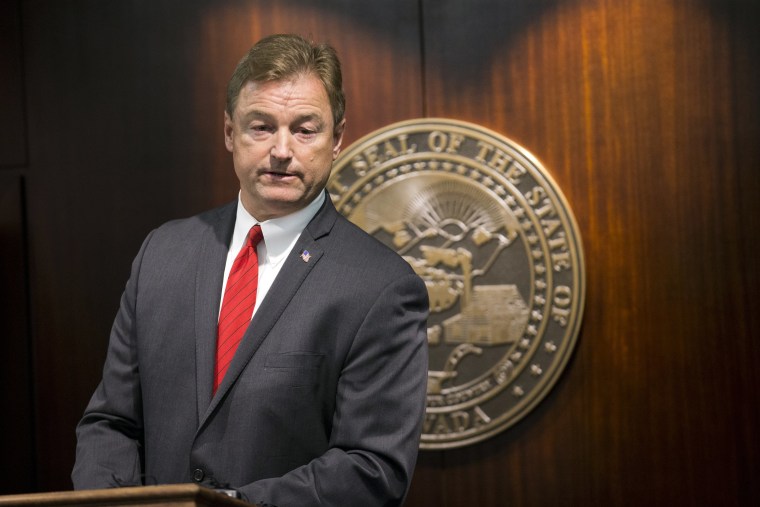Of every Republican senator up for re-election next year, only one represents a state that Hillary Clinton won last year: Sen. Dean Heller of Nevada.
He's the same GOP senator who this afternoon announced his opposition to his party's far-right health care plan.
"This bill that's currently in front of the United States Senate ... is simply not the answer, and I'm announcing today that in this form I will not support it," Heller said at a news conference in Las Vegas with Gov. Brian Sandoval Friday morning, pointing to the bill's dramatic reductions in Medicaid. [...]More than 600,000 people in Nevada are on Medicaid, including disabled and low-income children.
Heller added that it will be "very difficult" to get him to change his mind about the legislation.
Now, I know what you're thinking, and I don't blame you. We talked just yesterday about Republicans who publicly raise concerns about a bill they ultimately intend to support, hoping to get some concessions from party leaders before ending the charade and rejoining the party fold. It's the "squeaky wheel" approach to the legislative process, and it's been around for years.
Heller's comments, however, are qualitatively different. Anything's possible with this crowd, but his objections are based on the Medicaid cuts that are at the heart of the broader Republican effort. The Nevadan made quite a spectacle of his decision today, and unless Mitch McConnell intends to completely overhaul the entire legislation -- an unlikely scenario -- it's difficult to imagine Heller going back on his word now.
Indeed, it's entirely possible Heller made this decision with McConnell's blessing: had the Nevada Republican supported this health care monstrosity, his odds of getting re-elected, which are already suspect, would get quite a bit worse.
And so, unless Heller is prepared to make a very public betrayal, he is the first credible "no" vote from the Senate Republican conference on the GOP health care bill. For health care advocates, this is an important breakthrough, but it's not enough.
The arithmetic is pretty straightforward: there are 52 Senate Republicans, and their far-right health care overhaul will need 51 votes to pass. If one or two GOP senators break ranks and decide they can't support the bill, that won't be enough to change the outcome: Vice President Mike Pence would break the tie and advance the legislation. If three or more Republicans oppose the plan, it dies.
So, if Heller's "no" vote is #1, health care advocates will need two more.
There's a fair amount of chatter about the four Senate Republicans -- Ted Cruz, Ron Johnson, Mike Lee, and Rand Paul -- who issued a lukewarm, almost mealy-mouthed statement, yesterday, But of the quartet, I find it hard to imagine anyone but Rand Paul actually following through.
The more interesting faction is the less conservative senators: Maine's Susan Collins and Alaska's Lisa Murkowski. The conventional wisdom among Republicans is that GOP moderates "always cave," which is generally a sound rule, but Collins -- who's rumored to be interested in a gubernatorial campaign -- sounded awfully skeptical of her party's plan during an MSNBC interview yesterday.
Murkowski strikes me as more of a wild card. She has all kinds of very good reasons to oppose the regressive plan, but GOP leaders have catered the bill with the Alaska Republican in mind -- prepared to hear quite a bit about the "Klondike Kickback" -- and she'll face enormous pressure to prioritize her party's interests.
By any measure, though, Heller's announcement changes the landscape. Especially among Senate Republicans, it's tough to go first -- breaking ranks when no one else is -- and the fact that the Nevadan all but guarantees that there will be bipartisan opposition to the GOP bill makes it more likely that other Senate Republicans will follow Heller's lead. It's not complicated: if Collins, Murkowski, or others are inclined to vote "no," now they have some cover.
Postscript: White House Press Secretary Sean Spicer suggested today one Democratic senator, West Virginia's Joe Manchin, might be in play. Manchin's office shot that rumor down almost immediately.
